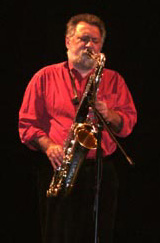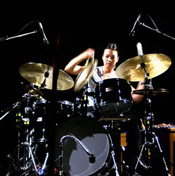| |
Evan
Parker & Susie Ibarra
Houston TX, 10 April 2001
by Frank Rubolino
September 2001
 Evan
Parker and Susie Ibarra appeared in concert at Rice University's
Hamman Hall on a program co-sponsored by the school's radio station
KTRU, and Diverse Works (an art center dedicated to presenting new
visual, performing, and literary art). The concert was part of an
April USA tour Parker made, which also included duets with Ibarra
in Austin and New Orleans and five solo concerts in several southern
cities and the nation's capital. Parker, of course, is one of the
most influential European performers on the new music scene, and
he has held that status for three decades. Ibarra is a musician whose
talent is synonymous with innovation, and she has risen to star status
in a relatively short timeframe. She first appeared on the scene
in the 1990s, and no drummer in recent years has made such an immediate
impact as she has. The music, however, is a bridge that unites the
ages and crumbles any perception of generation gap, so the union
of these two was a natural pairing of kindred spirits. Evan
Parker and Susie Ibarra appeared in concert at Rice University's
Hamman Hall on a program co-sponsored by the school's radio station
KTRU, and Diverse Works (an art center dedicated to presenting new
visual, performing, and literary art). The concert was part of an
April USA tour Parker made, which also included duets with Ibarra
in Austin and New Orleans and five solo concerts in several southern
cities and the nation's capital. Parker, of course, is one of the
most influential European performers on the new music scene, and
he has held that status for three decades. Ibarra is a musician whose
talent is synonymous with innovation, and she has risen to star status
in a relatively short timeframe. She first appeared on the scene
in the 1990s, and no drummer in recent years has made such an immediate
impact as she has. The music, however, is a bridge that unites the
ages and crumbles any perception of generation gap, so the union
of these two was a natural pairing of kindred spirits.
The
program opened with Parker playing tenor as he and Ibarra delicately
established the sonic ambiance that would define the session. Parker
demonstrated his well-recognized fluttering technique on an extended
improvisation that explored the breadth and depth of the instrument's
capabilities. His ideas developed in logical sequence, progressively
building the tension in layers as the program became more intricate
and involved. The music held a sense of quietude devoid of any riotous
extroverted behavior. Although the passion and intensity of his playing
was fully evident, the music had a calming effect filled with the
warmth he was able to project while taking the tenor to exotic realms.
For over 20 minutes, he continued to wander through unknown territory
without ever conveying the feeling of having trod that ground before.
 Ibarra
masterfully merged a plethora of drum and percussion nuances into
the meld. With deft handling, she inserted shimmering sounds of cymbals,
rattles, gongs, bells, beads, and numerous other implements to color
the music in varied hues. She followed Parker's sonic venture with
a drum solo that was the epitome of subtlety and taste. While Ibarra
has shown (most notably with William Parker's In Order to Survive
and with the David S. Ware Quartet) that she can be monstrously overt,
she sculpted a more subdued drum portrait on this occasion. Using
padded mallets against the rims and cymbals, plus the variety of
ambiance-enhancing percussion tools, she shaded the instant compositions
with feathery droplets of energy in keeping with the spiritual tact
Parker had taken. Her playing unfolded as a blanket of sound covering
the streams of energy flowing so gracefully from Parker. Ibarra
masterfully merged a plethora of drum and percussion nuances into
the meld. With deft handling, she inserted shimmering sounds of cymbals,
rattles, gongs, bells, beads, and numerous other implements to color
the music in varied hues. She followed Parker's sonic venture with
a drum solo that was the epitome of subtlety and taste. While Ibarra
has shown (most notably with William Parker's In Order to Survive
and with the David S. Ware Quartet) that she can be monstrously overt,
she sculpted a more subdued drum portrait on this occasion. Using
padded mallets against the rims and cymbals, plus the variety of
ambiance-enhancing percussion tools, she shaded the instant compositions
with feathery droplets of energy in keeping with the spiritual tact
Parker had taken. Her playing unfolded as a blanket of sound covering
the streams of energy flowing so gracefully from Parker.
Parker
also showed his mastery over the soprano saxophone. Making extensive
use of circular breathing, his solos hit ear-piercing highs with
a whirlwind of spiraling notes spinning out of his horn. He took
on the appearance of a true pied piper as the squeaky pitch from
the soprano eddied in swarms of mesmerizing bee-like sonority. His
opening 11-minute soprano solo on the second set was a marvel in
control where no evidence of breathing was obvious for the duration
of the piece. Ibarra continued to envelop the set by injecting varied
patterns including march rhythms to keep the music stimulating and
alive. She occasionally made overt gestures through the bass drum
when Parker showed some tenor muscle, but even these statements were
contained and softened.
Parker announced the closing number as a composition by Ibarra that
"she is just about to write now". It summed up perfectly the concept
of instant composing that erupted so effortlessly from these two musicians.
Although they are from very diverse backgrounds and are separated
in age by many years, none of that seemed to matter on this night.
They communicated as of one mind, and the audience at this heavily
attended event was treated to a magical performance.
|
|
|
|
|

